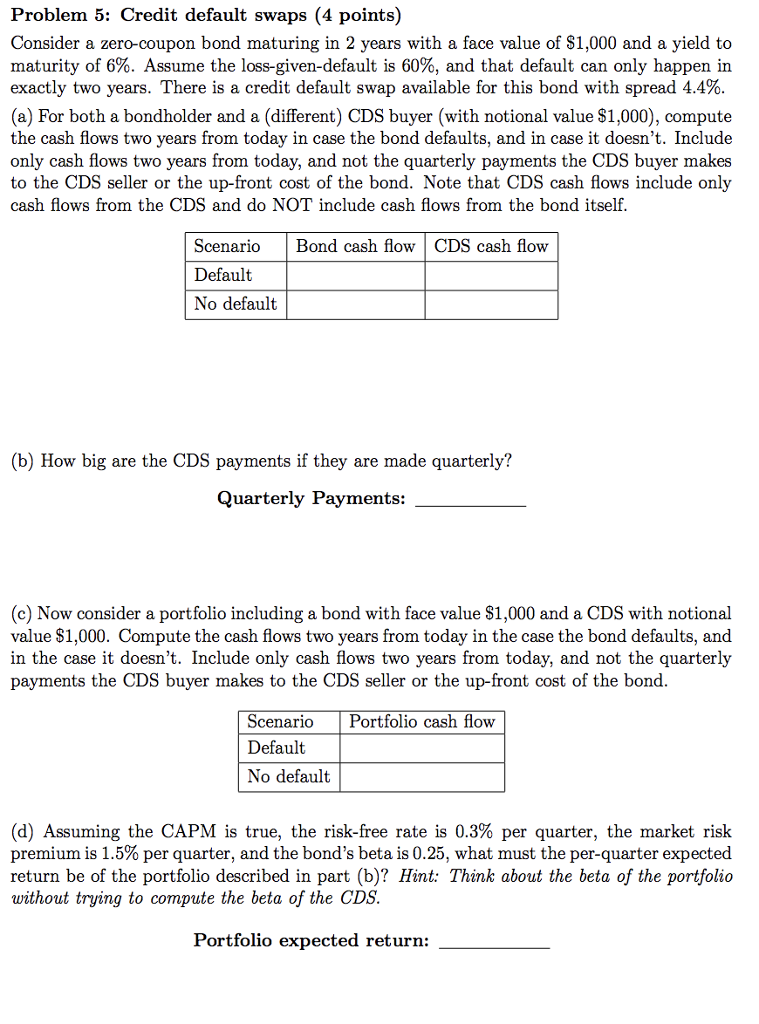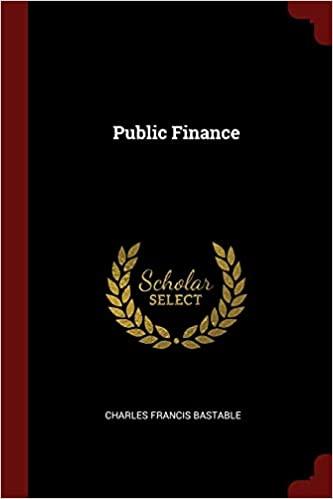
Problem 5: Credit default swaps (4 points) Consider a zero-coupon bond maturing in 2 years with a face value of S1,000 and a yield to maturity of 6%. Assume the loss-given-default is 60%, and that default can only happen in exactly two years. There is a credit default swap available for this bond with spread 4.4%. (a) For both a bondholder and a (different) CDS buyer (with notional value S1,000), compute the cash flows two years from today in case the bond defaults, and in case it doesn't. Include only cash flows two years from today, and not the quarterly payments the CDS buyer makes to the CDS seller or the up-front cost of the bond. Note that CDS cash flows include only cash flows from the CDS and do NOT include cash flows from the bond itself. Scenario Bond cash flow CDS cash flow Default No default (b) How big are the CDS payments if they are made quarterly? Quarterly Payments: (c) Now consider a portfolio including a bond with face value S1,000 and a CDS with notional value S1,000. Compute the cash flows two years from today in the case the bond defaults, and in the case it doesn't. Include only cash flows two years from today, and not the quarterly payments the CDS buyer makes to the CDS seller or the up-front cost of the bond. Scenario Portfolio cash flow Default No default (d) Assuming the CAPM is true, the risk-free rate is 0.3% per quarter, the market risk premium is 1.5% per quarter, and the bond's beta is 0.25, what must the per-quarter expected return be of the portfolio described in part (b)? Hint: Think about the beta of the portfolio without trying to compute the beta of the CDS. Portfolio expected return: Problem 5: Credit default swaps (4 points) Consider a zero-coupon bond maturing in 2 years with a face value of S1,000 and a yield to maturity of 6%. Assume the loss-given-default is 60%, and that default can only happen in exactly two years. There is a credit default swap available for this bond with spread 4.4%. (a) For both a bondholder and a (different) CDS buyer (with notional value S1,000), compute the cash flows two years from today in case the bond defaults, and in case it doesn't. Include only cash flows two years from today, and not the quarterly payments the CDS buyer makes to the CDS seller or the up-front cost of the bond. Note that CDS cash flows include only cash flows from the CDS and do NOT include cash flows from the bond itself. Scenario Bond cash flow CDS cash flow Default No default (b) How big are the CDS payments if they are made quarterly? Quarterly Payments: (c) Now consider a portfolio including a bond with face value S1,000 and a CDS with notional value S1,000. Compute the cash flows two years from today in the case the bond defaults, and in the case it doesn't. Include only cash flows two years from today, and not the quarterly payments the CDS buyer makes to the CDS seller or the up-front cost of the bond. Scenario Portfolio cash flow Default No default (d) Assuming the CAPM is true, the risk-free rate is 0.3% per quarter, the market risk premium is 1.5% per quarter, and the bond's beta is 0.25, what must the per-quarter expected return be of the portfolio described in part (b)? Hint: Think about the beta of the portfolio without trying to compute the beta of the CDS. Portfolio expected return







